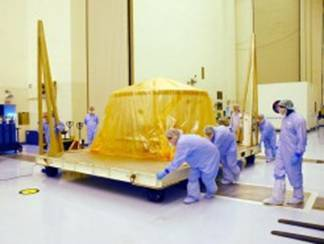09 May 2007

Credit: NASA-KSC
On 7 May 2007, a military cargo aircraft carried NASA's Phoenix Mars Lander spacecraft from Colorado to Florida, where Phoenix will start an interplanetary cruise to the Red Planet in August 2007.
After arrival at Mars, Phoenix will land on a Martian polar plain Spring 2008. It will use a robotic digging arm and other instruments to search for signs of possible habitats for microbial life. Earlier studies conducted by orbiter spacecrafts, indicate that the soil holds frozen water within arm's reach.
"This is a critical milestone for our mission," said Peter Smith of the University of Arizona, Tucson, Principal Investigator for the Phoenix mission. "Our expert engineering team has completed assembly and testing of the spacecraft. The testing shows our instruments are capable of meeting the high-level requirements for the mission."
Assembling and testing the spacecraft lasted over a year in Denver.
"We are excited to be going back to Mars," said Ed Sedivy, Phoenix Program Manager at Lockheed Martin Space Systems Co., Denver. "Assembly, integration and testing of the spacecraft have gone very well. We delivered Phoenix stowed inside its back shell and it will stay in that configuration until it lands softly on Mars."
Phoenix will be launched aboard a Delta II rocket from Cape Canaveral Air Force Station, Florida, no earlier than 3 August 2007. The launch window extends from 3 to 24 August. Earth and Mars are positioned properly for launches every 2 years. This year witnesses a favorable opportunity to land a space probe in high Martian northern latitudes, as the probe will arrive when sunlight intensity peaks there.
"The arctic plains are the right place for the next step in Mars exploration, and this is the right time to go there," said Leslie Tamppari, Phoenix Project Scientist at NASA's Jet Propulsion Laboratory, Pasadena, California. "We expect to touch Martian ice for the first time, a real leap in NASA's follow-the-water strategy. The lander needs solar energy, and we will arrive for a three-month prime mission right at the end of northern Mars' spring."
Phoenix will be prepared for launch in NASA's Kennedy Space Center (KSC), Florida. Phoenix is the first mission of NASA's Mars Scout Program of competitively proposed, relatively low-cost missions to Mars.
Further Reading
Phoenix Mars Mission
http://phoenix.lpl.arizona.edu/
Aymen Mohamed Ibrahem
Senior Astronomy Specialist